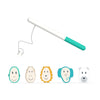How to Get A Baby To Sleep Throughout The Night?
Wondering if or when your little one is going to start sleeping through the night? Well, the answer isn’t as straightforward as you might hope, as some babies sleep through the night from a very young age whereas others may not sleep through until they’re a little older.
Your baby will have a waking and sleeping schedule of their own, and it is unlikely to be the same as other babies. Therefore, the team at Matchstick Monkey have put together some of our top tips on how to get your baby to sleep through the night.
When will my baby start sleeping through the night?
Sleeping through the night is commonly described as sleeping overnight for six to eight straight hours. But note, depending on age and stage, babies will require different amounts of sleep - from total hours of sleep each day, to how many hours a night they sleep, to normal napping patterns. Knowing the sleeping needs of your child will help you set boundaries and bedtime rules for your little one.
1 to 4 weeks old
Newborns sleep about 16-17 hours a day, with wakefulness cycles that last 1-3 hours. Most newborns, however, have not formed a pattern of night/day sleep, so their cycles of sleep and wakefulness can differ to all day hours.
1 to 4 months old
Babies of this age still tend to sleep about the same amount of hours, but their night/day sleep cycles are starting to kick in, allowing them to sleep longer at night, though they are still waking up for feedings and changes.
4 months to 1 year
Babies of that age also need about 14-15 hours of daily sleep. Many can sleep through most of the night, however, and take up to 3 naps during the day and at night. It's important to really start developing healthy sleep habits for your child during this time.
Matchstick Monkey Sleeping Tips:
1. Establish a bedtime routine
It's never too early to begin a bedtime routine. You should have a simple and sustainable bedtime routine, so it's easy for you to do it every night. Even the slightest shift in the routine of your baby will leave them feeling off, and waking up more often at night, unexpectedly. Have relaxing, soothing activities, such as swaddling and shushing, to which your baby seems to respond. For your baby, the bedtime routine may be where you establish meaningful sleep associations.
2. Teach your baby to self-soothe
It's always safe to go check on your baby when they wake up in the middle of the night and call for you. Try to restrict your time with them during those checks though. For a few moments, put your hand on their chest to comfort them, then leave the room. This will help to ease the fear of separation, break the sleep connection to fall back to sleep, and help your baby learn to soothe themself.
3. Start reducing the night feedings
You should slowly start reducing feeding times once you get the okay from your doctor to avoid night feedings. Feeding becomes a sleep association in certain ways, because you feed your baby every time they wake up. Just because it isn't required anymore, doesn't mean that your child won't want it anymore. Wean them slowly from the night feedings, feeding them less during the night for a few days to get them used to not feeding every time they wake.
4. Follow a schedule
To brace them for the right amount of night time sleep, make sure your baby gets the right amount of daytime sleep. Babies do not distinguish between day and night as newborns, they sleep round the clock. As they get older, longer periods of sleep begin, with the longest stretches being at night. They won't stay asleep for as long at night if they sleep too much during the day.
5. Keep a calming ambience
Ambience can make a huge difference! Keep the room at a reasonable temperature, make sure it stays quiet, and even try to add a little white noise! The softest sounds will annoy your baby at night, the white noise will give them a constant, calming sound to fall asleep to, and any other noises happening in the house will be drowned out.
6. Stick to an appropriate bedtime
It is more likely that putting your child to sleep later in the expectation that they can sleep later in the morning won't succeed. If you're following a plan, it's crucial for your little one to maintain an acceptable bedtime to keep them on track. Note, there is no fixed bedtime for newborns, since they only sleep whenever they need to. But you will begin to develop a healthy bedtime about 3 months old to complement your sleep schedule.
7. Be patient
If your baby had been sleeping on her own during the night before, and suddenly stopped, it could be the fault of a sleep regression or growth spurt. Development spurts typically last just a few days and your baby can return to normal patterns afterwards. A regression can be 1-4 weeks long. During times like these, be careful and reflect on the fact that it won't last.
Check out more of our parenting blogs!
At Matchstick Monkey, we have a couple of blogs posts on how to get your baby to sleep through the night:





























